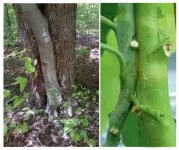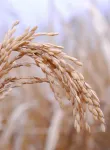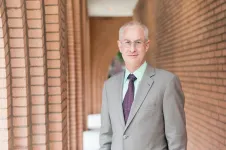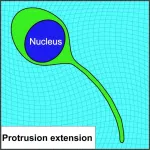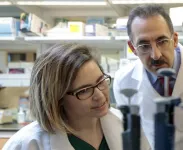Biomarkers in fathers' sperm linked to offspring autism
2021-01-11
(Press-News.org) PULLMAN, Wash. - Biomarkers in human sperm have been identified that can indicate a propensity to father children with autism spectrum disorder. These biomarkers are epigenetic, meaning they involve changes to molecular factors that regulate genome activity such as gene expression independent of DNA sequence, and can be passed down to future generations.
In a study published in the journal Clinical Epigenetics on Jan. 7, researchers identified a set of genomic features, called DNA methylation regions, in sperm samples from men who were known to have autistic children. Then in a set of blind tests, the researchers were able to use the presence of these features to determine whether other men had fathered autistic children with 90% accuracy.
"We can now potentially use this to assess whether a man is going to pass autism on to his children," said Michael Skinner, professor of biological sciences at Washington State University and corresponding author on the study. "It is also a major step toward identifying what factors might promote autism."
Incidence of autism spectrum disorder has increased dramatically over time from 1 in 5,000 people in 1975 to 1 in 68 in 2014. While improved diagnosis and awareness can account for some of that change, many researchers believe the recent increase over the last two decades may be due to environmental and molecular factors. Previous studies have also shown that children can inherit the disorder from their parents, and that fathers are more often linked to autism transmission than mothers.
In the current study, researchers from WSU, Valencia Clinical Research Center and Valencia University in Spain, looked at sperm epigenetics, the molecular processes that affect gene expression, in two groups of men: 13 who had fathered sons with autism, and 13 who had children without the disorder. They looked specifically at DNA methylation, a chemical modification that happens when a methyl group attaches to a DNA strand and can turn genes on or off.
The researchers identified 805 different DNA methylation regions that can potentially act as an epigenetic biomarker for susceptibility to father offspring with autism. They tested their findings by attempting to identify fathers who did or did not have autistic children just from their sperm samples. In blind tests of 18 men, they correctly identified all the fathers, except for two false negatives, an accuracy rate of about 90%.
More work and expanded trials need to be done to develop the study's findings into a potential medical tool, and Skinner and his colleagues are working on a more extensive study involving more than 100 men.
With further research, this biomarker could also be used to trace how the epigenetic changes occurred in the first place, said Skinner.
"We found out years ago that environmental factors can alter the germline, the sperm or the egg, epigenetics," said Skinner. "With this tool we could do larger population-based studies to see what kinds of environmental factors may induce these types with epigenetic changes."
INFORMATION:
ELSE PRESS RELEASES FROM THIS DATE:
2021-01-11
New research shows people who pursue meaningful activities - things they enjoy doing - during lockdown feel more satisfied than those who simply keep themselves busy.
The study, published in PLOS ONE, shows you're better off doing what you love and adapting it to suit social distancing, like swapping your regular morning walk with friends for a zoom exercise session.
Simply increasing your level of activity by doing mindless busywork will leave you unsettled and unsatisfied.
Co-lead researcher Dr Lauren Saling from RMIT University in Melbourne, Australia said while novelty lockdown activities - like baking or painting - have their place, trying to continue what you enjoyed before lockdown can be more rewarding.
"Busyness might be distracting but it won't necessarily be fulfilling," ...
2021-01-11
COVID-19 infections are once again rising at an alarming rate in San Francisco's Latinx community, predominantly among low-income essential workers, according to results of a massive community-based testing blitz conducted before and after the Thanksgiving holiday by Unidos En Salud -- a volunteer-led partnership between the Latino Task Force for COVID-19 (LTF), UC San Francisco , the Chan Zuckerberg Biohub (CZ Biohub), and the San Francisco Department of Public Health (SFDPH).
Unidos En Salud launched their "Healthy Holidays" initiative the weekend before Thanksgiving (Nov. 22-24) in San Francisco's Mission District, where they have been perfecting their community-based surveillance testing ...
2021-01-11
The genetic material of plants, animals and humans is well protected in the nucleus of each cell and stores all the information that forms an organism. For example, information about the size or color of flowers, hair or fur is predefined here. In addition, cells contain small organelles that contain their own genetic material. These include chloroplasts in plants, which play a key role in photosynthesis, and mitochondria, which are found in all living organisms and represent the power plants of every cell. But is the genetic material actually permanently stored within one cell? No! As so far known, the genetic material can migrate from cell to cell and thus even be exchanged between different organisms. Researchers at the Max Planck Institute of Molecular Plant Physiology (MPI-MP) ...
2021-01-11
We are fascinated by machines that can control cars, compose symphonies, or defeat people at chess, Go, or Jeopardy! While more progress is being made all the time in Artificial Intelligence (AI), some scientists and philosophers warn of the dangers of an uncontrollable superintelligent AI. Using theoretical calculations, an international team of researchers, including scientists from the Center for Humans and Machines at the Max Planck Institute for Human Development, shows that it would not be possible to control a superintelligent AI. The study was published in the Journal of Artificial Intelligence Research.
Suppose someone ...
2021-01-11
When an accident occurs, the reactions of bystanders are important. Researchers have studied whether laypeople realise the severity of the situation when someone in their proximity begins to bleed, and whether they can estimate how much the person is bleeding. The results show a discrepancy related to the victim's gender: for a woman losing blood, both blood loss and life-threatening injuries were underestimated. The study has been published in the scientific journal PLoS One.
Researchers from Linköping University and Old Dominion University in the United States wanted to study the ability of laypeople to visually assess blood loss, and what influences them when judging the severity of an injury.
"Laypeople's ...
2021-01-11
Recent years have provided substantial research displaying the effect of genetic mu-tations on the development of autism and other neurodevelopmental disorders. Based on those studies, researchers have focused attention on the commonalities be-hind those mutations and how they impact on the functioning of the brain. A study conducted by Professor Sagiv Shifman from the Life Sciences Institute at the He-brew University of Jerusalem and the Center for Autism Research has found that genes associated with autism tend to be involved in the regulation of other genes and to operate preferentially in three areas of the brain; the cortex, the striatum, and the cerebellum.
The cerebellum ...
2021-01-11
Rice is the staple food of about half the world's population. The cultivation of the rice plant is very water-intensive and, according to the German aid organization Welthungerhilfe, around 15 per cent of rice is grown in areas with a high risk of drought. Global warming is therefore becoming increasingly problematic for rice cultivation, leading more and more often to small harvests and hunger crises. Crop failures caused by plant pathogens further aggravate the situation. Here, conventional agriculture is trying to counteract this with pesticides, which are mostly used as a precautionary measure in rice cultivation. The breeding of resistant plants is the only alternative to these environmentally harmful ...
2021-01-11
Seeking to understand why COVID-19 is able to suppress the body's immune response, new research from the USC Leonard Davis School of Gerontology suggests that mitochondria are one of the first lines of defense against COVID-19 and identifies key differences in how SARS-CoV-2, the virus that causes COVID-19, interacts with mitochondrial genes when compared to other viruses.
These differences offer possible explanations as to why older adults and people with metabolic dysfunction have more severe responses to COVID-19 than other individuals, and they also provide a starting point for more targeted experiments that may help identify therapeutics, said senior author Pinchas Cohen, professor of gerontology, ...
2021-01-11
Our bodies often dispatch stem cells to mend or replace biological damage, but how these repair agents make their way through dense tissue to arrive at the scene had been a mystery. "How stem cells squeeze through tissue openings a hundred to a thousand times smaller than themselves had been a perplexing question," says Ovijit Chaudhuri, professor of mechanical engineering.
In an article published in the Jan. 8 edition of Science Advances, Chaudhuri and colleagues reveal that stem cells use their nucleus - a large, stiff organelle within the cell - as a means of propulsion.
Their discovery was surprising because scientists had thought cells would have particular ...
2021-01-11
(St. Louis) - A new study by investigators at the Shriners Hospital for Children -- St. Louis suggests the damaging effects of obesity are not due to body weight but rather come from something much smaller - biochemical signals released by fat cells.
The study focuses on the link between overweight or obesity and the development of osteoarthritis, a painful disease of the joints. The investigation was led by Dr. Farshid Guilak, director of the St. Louis Shriners Hospital Research Center.
"We've shown here that it's not overloading of the joints that is responsible for osteoarthritis, but, more likely, a factor given off by fat cells that makes cartilage susceptible to degeneration," ...
LAST 30 PRESS RELEASES:
[Press-News.org] Biomarkers in fathers' sperm linked to offspring autism
